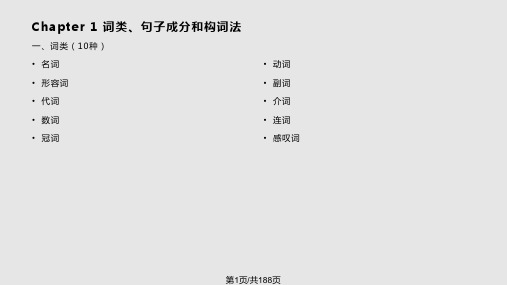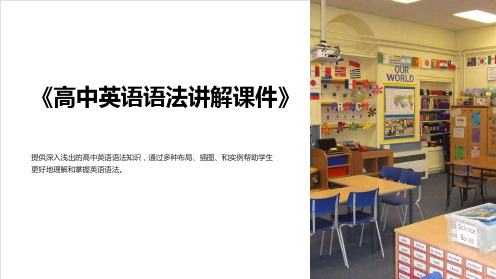高中英语语法课件[原创]
《高考英语语法》课件

Object and completion
Object
The person or thing that received the action, or is described in the presence
Complex
A word or phrase that completes the meaning of the subject or predicate, often indicating a relationship or a quality
Non fine verbs
04
Infinitive
Infinitive is a form of non finite verb in English, usually indicating the basic form of the verb without changes in tense and voice.
Present Continuous
The present continuous tense is used to talk about actions that are ongoing at the moment of speaking
Past tense
Simple Past
The simple past tense is used to talk about actions that happened and completed in the past
Improve English language ability
By learning English grammar, students can improve their English language ability, including reading, writing, speaking, and listening
高中英语语法全套课件(561张PPT) - 副本

6. 情态动词的其它一些用法
D 1. I wonder how he _______ that to the teacher. (1996上海) A. dare to say B. dare saying C. not dare say D. dared say 注意比较 dare 和 need 的两种词性的不同用法。 2. The fire spread through the hotel very quickly but everyone C ______ get out. (N 1997) A. had to B. would C. was able to D. could 注意比较 could 与 was able to 的用法区别。
A. shall
B. must
C. may
D. can
说明:must 加动词原形表示“必须做”;may 加动词原
形表示“可能会做”;can 加动词原形表示“能够做”;
can 表示“可能性”时一般用在问句和否定句中。该句的 关键在于“but she isn’t quite sure yet‖。
2. There _________ be any difficulty about C
此句谈论的是过去的经历,故 A、B 不合题意;must 表示 判断和推测只能用在肯定句中。
C 4. Susan_______ written a report like this. (1995上海) A. can have B. mustn’t have
C. can’t have D. ought to not have
3. --- There were already 5 people in the car but they managed to take me as well. --- It ________ a comfortable journey. (N 1995) D A. can’t be B. shouldn’t be C. mustn’t have been D. couldn’t have been
高中英语语法:动词的时态课件

二、一般过去时
(2)语境中的一般过去时,往往表示“刚才,在过去”之意,暗 示现在“已不再这样”。 Oh,how nice of you! I never thought you were going to bring me a gift.噢,你真是太好了!我没想到你会给我送礼物。 I didn’t notice where I was going.我当时没有注意到正往哪儿走。 Oh, it’s you, Mary. I didn’t know you would come.噢,是你啊,玛 丽,我不知道你会来。 (3)在时间和条件状语从句中,代替过去将来时。 Mary said as soon as she arrived there, she would ring me up.玛丽说 她一到达那里就给我打电话。
read reads读
write writes写
become becomes变成
know knows知道
一、一般现在时
(2)以字母s,x, ch, sh,o结尾的单词在词尾加-es。
watch watches观看
do does做
guess guesses 猜测
finish finishes完成
(3)以“辅音字母+y”结尾的动词,先变y为i,再加-es。
动词的时态综述
英语动词的时态变化共有一般、完成、进 行和完成进行4种形式,每种形式又包括现在、 过去、将来和过去将来4个时间,共组合成16 种时态形式。 高中英语课程标准要求同学们掌握的时态只有 8种:一般现在时、一般过去时、一般将来时、 现在进行时、过去进行时、现在完成时、过去 完成时、过去将来时。
stir
stirred搅拌
planΒιβλιοθήκη planned计划二、一般过去时
高中英语语法大全PPT课件

• 形容词→副词 early→early, fast→fast
• 副词→连词 when(什么时候)→(当……时候)
• 介词→副词 in(到……里)→(在里面;在家),on(在…上)→(进行,继续),
第6页/共188页
Chapter 2 名词
• 专有名词 Beijing, Tom, the People’s Republic of China • 普通名词
▲可数名词 ▲不可数名词
第7页/共188页
一、英语可数名词的单复数
• 规则变化 ①在单数名词词尾加s ②s,o,x ,sh,ch结尾的词加es ③以辅音字母加y结尾的名词,变y为i,再加es ④以f或fe结尾的名词,变f或fe为v,再加es。
第15页/共188页
主主格格 宾宾格格
第第一一人人 称称单单数数
第第二二人人 称称单单数数
第第三三人人称称单单数数
男男
女女
II
YYoouu hhee
sshhee
((我我))
((你你))
((他他))
((她她))
mmee
yyoouu
hhiimm
hheerr
((我我))
((你你))
((他他))
((她她))
语或者表语,后面千万不可以跟名词 eg. This is your cup,but where is mine?(这是你的杯子,可我的在哪儿?) • 双重所有格:“of + 名词性物主代词”
第18页/共188页
第一人 第二人 称单数 称单数
第三人称单数
男
女
中性
第一人 第二人 第三人 称复 称复数 称复数 数
高中英语语法——倒装(35张PPT)-经典通用课件资料

neither/ nor did he stood a
助动词auxiliary/情态动词modal verb + subject + v +…
Nerve will I forgive you.
2021/10/10
4
全部倒装 1. 用于 there be 句型。
There are many students in the classroom.
原句自然顺序是: Many students are there in the classroom.
Grammar Inversion
2021/10/10
1
语法精解
1. 倒装 Inversions 英语句子的自然顺序是主语在前, 谓语在后。把谓语动词放在主语之前, 就叫倒装结构。如果全部谓语 放在主语之前, 叫全部倒装; 如果只把助动词或be 动词放在主语之前就叫部分倒装。
2021/10/10
2
主语位于谓语are there之后
2021/10/10
5
2. 用于“here (there, now, then) + 不及物动词 + 主语的句型中, 或以out, in, up, down, away 等副词开头 的句子里面,表示强调。
2021/10/10
6
Here comes the bus.
Hardly had she gone out
2021/10/10
32
3. I didn’t go there. He didn’t go there either. I didn’t go there, ________________.
4. A terrible Genie (妖怪) stood before the fisherman. Before the fisherman ______ _____________.
高中英语语法全套课件(561张PPT)完美版

问题2: The ______ of the building are covered with lots of ______. A.roofs; leaves B.rooves; leafs C.roof; leaf D.roofs; leafs
以 f 或 fe 结尾的名词变复数时: a. 加 s,如:serf --- serfs belief---beliefs roof---roofs chief --- chiefs safe---safes gulf---gulfs; b. 去 f, fe 加 ves,如:half---halves knife---knives leaf---leaves wolf---wolves wife---wives life---lives thief---thieves; c. 均可, 如:handkerchief --handkerchiefs / handkerchieves
works, means, head
问题4: Some ______ visited our school last Wednesday. A.German B.Germen C.Germans D.Germens
国家人的名词需要记住三种情况:
1、单复数同形:Chinese; Japanese; Swiss 2、需要变形:Englishman - Englishmen 3、加 –s 或 -es:German – Germans 详见下表。
_____.A habit B hobby C fun D game (2001上海
春季)
问题3: Many people agree that ____of English is a must in international trade today. (NMET96) A. a knowledge B. knowledges C. knowledge D. the knowledge
高中英语语法大全ppt课件

三:宾语从句
1.定义:用作宾语的从句叫宾语从句。 2.构成:关联词+简单句 3.引导宾语从句的关联词有三类:
(1)从属连词that。如:He told us that he felt ill.他对我们说他 感到不舒服。I know he has returned.我知道他已经回来了。注: that在引导宾语从句时也并不是任何情况下都可以省略。在以下 情况下,that不能省略。
(1)介词宾语从句 宾语从句也可用作介词的宾语。如:He was deeply displeased by what had occurred that day.他对那天发生的事感到很不快。I walked over to where she sat.我走向她坐的地方。I am curious as to what he will say.我很想知道他要说什么。Your success will largely depend upon what you do and how you do it.你是否成功将主要取决于你做什么和怎样做。有 时介词可以省略。如:I don’t care (for)who marries him.我不管谁跟他结婚。 Be careful (as to)how you do that.你要注意做这件事的方式。
作,这个问题需要考虑。We haven't yet settled the question where
we are going to spend our summer vacation.到哪儿去度暑假,这个问
题我们还没有决定。It is a question how he did it.那是一个他如何做
了此事的问题。
9
五:不定式的构成
1.不定式的构成 不定式是由不定式符号to+动词原形构成,在某些情 况下to也可省略。不定式一般有时式和语态的变化,通常有下表中 的几种形式(以do为例):主动式 被动式 一般式to do to be done 完成 式to have done to have been done 进行式to be doing/完成进行式to
《高中英语语法讲解课件》

and functions in
characteristics and usage.
sentences.
3 Importance of Parts of Speech
Understand why understanding and identifying the parts of speech is essential for effective communication in English.
Discover how to express implied conditions in English. Understand when to use implied conditions in sentences.
Reported Speech
Introduction
Learn about reported speech and how it is used to convey what someone else has said or written. Understand the transformation of direct speech into reported speech.
Conditional Clauses
Understand the structure and usage of conditional clauses. Learn how to form and combine clauses to create conditional sentences.
Implied Conditions
Pronouns
Understand the different types of pronouns, such as personal pronouns, possessive pronouns, reflexive pronouns, and demonstrative pronouns. Learn how to use pronouns as substitutes for nouns.
高中英语语法教学课件

四、使用不定式作宾语补足语时,不定式符号 to 的取舍问题:
1、在hear, listen to, let, have, make, see, watch, notice, observe 等动词后的不定式需省去 to 。 2、feel 一词,跟 to be 型不定式带 to;跟 to do 型不定式不带 to。 3、help 一词后的不定式,可带 to,也可以不带 to。
二、宾语和其补足语之间的逻辑关系:
3、当过去分词充当宾语补足语时,它与宾语之间有着动宾关系,即:宾语是过去分词所表示的动作的承受者,如: I once heard this song sung in Japanese. (This song was once sung in Japanese.) I didn’t want the children taken out in such weather. (The children were taken out in such weather.)
6.此外,副词和介词短语也可以充当宾语补足语,如: When do you want it back? Why didn’t you invite them in? We could hear the children at play outside.
4、动词不定式: Nobody could make him change his mind. Would you like me to come along with you? He believed the earth to be a globe.
”
宾语和其补足语之间的逻辑关系:
二、宾语和其补足语之间的逻辑关系:
2、当现在分词和动词不定式充当宾语补足语时,它们和宾语之间有逻辑上的主谓关系,宾语补足语一般为宾语所做的动作,(若无宾语补足语,则句意不完整),如: He saw an old man getting on the bus. (An old man was getting on the bus.) Did you see a young man enter the house? (A young man entered the house.)
重要高中英语语法总结课件

一、教学内容1. 第一章:时态和语态一般现在时、一般过去时、一般将来时现在进行时、过去进行时、将来进行时现在完成时、过去完成时、将来完成时被动语态的构成及其用法2. 第二章:情态动词情态动词的用法及其区别情态动词与动词原形的搭配3. 第三章:非谓语动词动词不定式分词动名词4. 第四章:名词性从句主语从句宾语从句表语从句同位语从句5. 第五章:定语从句限制性定语从句非限制性定语从句关系代词和关系副词的用法二、教学目标1. 掌握高中英语语法的基本知识,提高英语表达能力。
2. 学会分析句子结构,能正确运用各种语法知识进行句子改写和翻译。
3. 培养学生的英语思维,提高他们运用英语解决实际问题的能力。
三、教学难点与重点1. 教学难点:非谓语动词、定语从句、名词性从句的用法和区别。
2. 教学重点:时态、语态、情态动词的用法及其在实际语境中的应用。
四、教具与学具准备1. 教具:PPT、黑板、粉笔2. 学具:笔记本、教材、练习册五、教学过程1. 导入:通过一个实践情景,引导学生复习已学过的语法知识,为新课的学习做好铺垫。
2. 新课内容:详细讲解每个语法点的用法,结合例句进行解释。
3. 例题讲解:针对每个语法点,给出典型例题,引导学生进行分析和解答。
4. 随堂练习:设计针对性的练习题,让学生当堂巩固所学知识。
6. 互动环节:鼓励学生提问,解答学生在学习过程中遇到的疑问。
六、板书设计1. 板书左侧:列出每个章节的语法点,以提纲形式呈现。
2. 板书右侧:针对每个语法点,给出典型例句和练习题。
七、作业设计1. 作业题目:用所学的时态和语态完成下列句子。
根据句意,选择合适的情态动词填空。
改写下列句子,用非谓语动词形式。
分析下列句子,判断定语从句的类型并找出关系词。
翻译下列句子,注意名词性从句的使用。
2. 答案:八、课后反思及拓展延伸1. 课后反思:对本节课的教学效果进行反思,分析学生的掌握程度,调整教学策略。
2. 拓展延伸:布置一些拓展性的学习任务,如阅读英语文章、观看英语视频等,让学生在课后进行自主学习,提高英语实际应用能力。
高中英语 倒装句 (全部倒装和部分倒装)语法课件(共21张)

语法高中课件ppt

STEP 03
分词
包括现在分词和过去分词 ,表示动作的进行状态或 完成状态。
表示动作的名词化,常用 于描述习惯或爱好。
虚拟语气
虚拟过去
表示与过去事实相反的情况,使用 “would+have+过去分词”的形式 。
虚拟现在
虚拟将来
表示与将来事实相反的情况,使用 “would+动词原形”的形式。
表示与现在事实相反的情况,使用 “would+动词原形”的形式。
表示主语的状态或特征。
表示主语执行的动作作用 于宾语,并补充说明宾语 的状态或特征。
时态和语态
现在时
表示现在发生的动作或状 态。
将来时
表示将来发生的动作或状 态。
完成体
表示动作已经完成。
过去时
表示过去发生的动作或状 态。
进行体
表示正在进行的动作。
被动语态
表示动作的承受者是主语 。
Part
03
复杂语法结构
介词
表示名词或代词与句子其他部分的关系。
词类
连词
连接两个句子或从句。
冠词
限制名词所指的范围。
句子结构
01
02
03
04
05
主语+谓语
主语+谓语+宾语 主语+谓语+间接 主语+谓语+表语 主语+谓语+宾语
宾语+…
+宾补
表示主语执行的动作或状 态。
表示主语执行的动作作用 于宾语。
表示主语执行的动作同时 作用于两个宾语。
学习建议与展望
复习与巩固
建议学生及时复习本课程所学内 容,通过练习题和语法填空等形 式巩固所学知识。
- 1、下载文档前请自行甄别文档内容的完整性,平台不提供额外的编辑、内容补充、找答案等附加服务。
- 2、"仅部分预览"的文档,不可在线预览部分如存在完整性等问题,可反馈申请退款(可完整预览的文档不适用该条件!)。
- 3、如文档侵犯您的权益,请联系客服反馈,我们会尽快为您处理(人工客服工作时间:9:00-18:30)。
1. That he came back made us happy.主语从
句 试比较:He came
back.
.
2. He pretended (that) he didn’t see me.宾语
从句试比较:He didn’t see me.
3. The fact is that he didn’t tell the truth.表语
1. whether 可引导主语/表语/同位语/宾语从句。
2. if 只引导宾语从句;不在介词后;
从句后有“or not”时也不可用。
Whether he will come or not doesn’t make any
difference.
They talked about whether it was worth doing.
He doesn’t know whether to go or not.
I want to know whether / if you like it.
(2) 选择性疑问从句由if/whether…or
whether…or not 构成
Please tell me whether / if he is Swedish or Dan
I don't care whether you like the plan or not.
注意:
whether与if 意义均为“是否”,但使用情况如下:
不定式,现在分词和过去分词
作宾补的区别
形式
语态
内容
被动语态
不定式
不带to 动词原形
与宾语是 主动关系
动作发生了
To要还原
现在分词
V.+ing
与宾语是 主动关系
动作正在进行
没变化
过去分词
V.+ed
与宾语是 被动关系
动作已经完成
没变化
I watched a boy cross the street. (不定式作宾补) They saw the boy playing near the lake.(现在分词作宾补) I heard my name called. (过去分词作宾补)
2. 同样地,Wh-从句作主语也常用先行词it做形 式主语,而将wh-从句置于句末,例如: 1) It is not yet decided who will do that job. 2) It remains unknown when they are going there.
3. What不一定翻译成“什么”,根据情况还可 以 翻译成“……所….”( = the thing that) I want to know what the boy’s name is. What I said did not refer to you. 我所说的事不是指
你。
三. if, whether引导的名词从句
来源于一般疑问句或选择疑问, 其功能同 wh-从句
(1) 来源于一般疑问句,翻译成“是否”
主语Whether the plan is good remains to be proved.
宾语:Let us know whether / if you can finish the
从句试比较:He didn’t tell the truth.
4. The news that he’ll come isn’t true.同位语
从句
试比较:He will come.
注意:
That-从句作主语通常用it作先行词,而将
that-从句置于句末。
例如:
It is quite clear that they’ve got everything ready. 很清楚,他们已经准 备好了一切。
二. 名词性 wh- 从句
名词性 wh- 从句来源于特殊疑问句
Wh-词包括who, whom, whose, whoever, what, whatever, which, whichever等连接代词 和where, when, how, why等连接副词。
Wh-从句的语法功能除了和that-从句一样外, 还可充当介词宾语和宾语补足语等
主语从句:How the book will sell depends on author
宾语从句:In one's own home one can do what one
likes.
The club knows why he left.
That depends on where we shall go.
名词性从句
名词性从句
名词性从句是由that,各种疑问词, if 和 whether, 充当连接词所引导的从句,其功能同名词一样
主语 表语 宾语 同位语
名词 √ √ √ √ 名词性从句 √ √ √ √
一. 名词性 that- 从句
名词性that-从句来源于陈述句。
在句中能充当主 语、宾语、表语、同位语。
article before Friday.
表语:The point is whether we should lend him the
money.
介词宾语: I worryFra bibliotekabout whether he can pass
through the crisis of his illness.
高中英语语法
分词作宾语补足语
宾语补足语(宾补),在宾语后面,补充说明宾语, 与宾语有逻辑上的主谓关系。
分词作宾补,一般用在感官动词和 使役动词 的 宾语后面
感官动词 hear, see, notice, watch, feel, find, leave… 使役动词 make, let, have, get, keep
I heard someone calling me.
I had
主谓
my bike
宾
stolen .
宾补
分词作宾语补足语
现在分词 过去分词
主语 谓语
宾语
宾语补足语
I heard the telephone
ringing.
I had
a bad tooth
pulled.
现在分词 与宾语是主动关系,表示动作在进行 过去分词 与宾语是被动关系,表示动作的完成和结果
表语从句:My question is who will be in charge
of the team soon .
同位语从句 Do you have any idea when the war
broke out ?
注意:
1. Wh-从句中,疑问词提前,后面用正常语序 What we will do next has not been decided yet.
